EXCLUSIVETen cars turning 40 this year - but does reaching the milestone make them bona fide classics?
- We take a look at 10 models that launched in 1984 - you can decide if they're deserving of classic car status
- Vehicles range from the mundane Austin Montego to the Peugeot 205 GTi hot hatch and Ferrari Testarossa
The Ferrari Testarossa turns 40 this year.
For those who remember the wedge-shaped Italian supercar breaking onto the scene and setting petrolheads' pulses racing, it probably doesn't feel like four long decades ago.
And there are a number of other recognisable motors that are hitting the same milestone this year - though not all of them are quite as iconic as the Ferrari poster car.
But does reaching 40 guarantee that a vehicle earns 'classic' status? Here's 10 examples of motors that arrived in 1984 - you can decide if they're deserving of it or not.
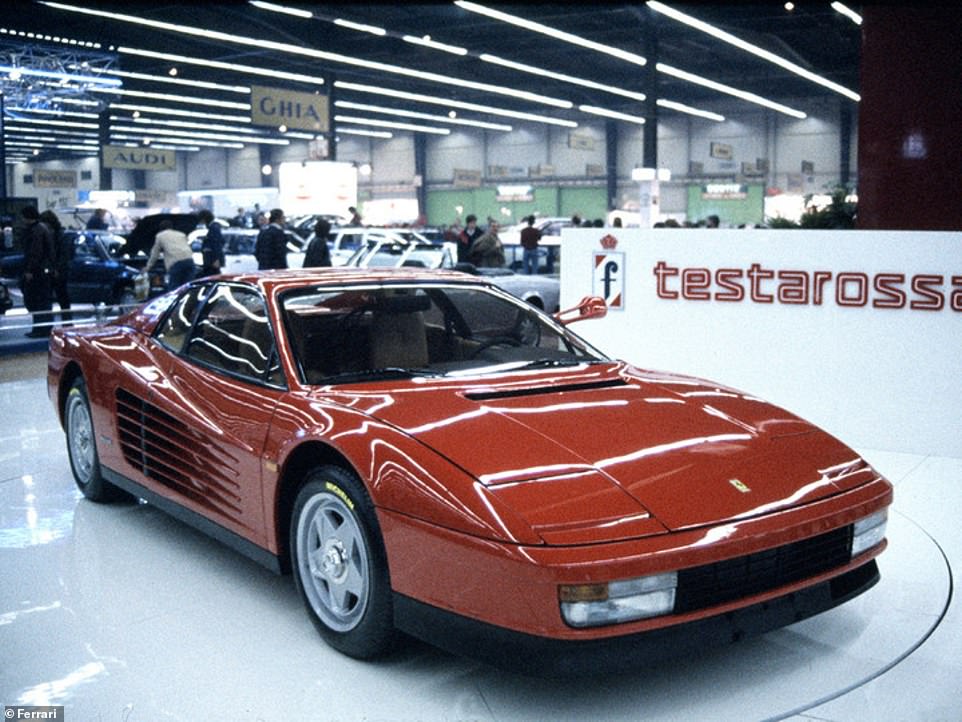
The Ferrari Testarossa - the poster supercar of the 1980s - turns 40 this year. That means some examples will start to qualify for historic vehicle exemptions. But just because a model hits the four-decade mark, does that really make it a classic? You decide from our list of 10 vehicles that debuted on our roads in 1984
While there is no set definition or time frame for when a car becomes a bona fide classic, many use the big four-zero as the trigger point for when vehicles can claim this status - or at least shift on from the modern classic label that's become popular in recent times.
That's because 40 is the age that a vehicle automatically begins qualifying for 'historical vehicle exemptions', one of which is avoiding vehicle excise duty (VED), meaning owners no longer need to pay road tax.
When cars reach their 40th birthday they also no longer need to pass an annual MOT and will automatically become exempt from some of the country's clean air zone charges, including London's £12.50-a-day ULEZ.
Of the selection of 1984 debutants featured in our list, there are some that you might not feel are deserving of the title of classic car.
To help you decide, we can tell you how much each is worth today - and if they're going up or down in value. Hagerty UK, which specialises in collectable car prices by tracking auction and private sales, has provided us with all the information you need to know.
It says that there's generally been a gradual decline in collectable car prices, pretty much across the market, since the post-pandemic boom times of 2022. As such, most of the cars below have dipped in value - though one in particular is bucking the trend...
1. Austin Montego

Of all the unlikely 'classic' cars, the Montego is near the top of the list. It was a big volume seller in the UK, though few are still on the road today
The Montego was an inspired move by British Leyland in 1984. With the company facing financial difficulties, it launched the Maestro in 1983 to help turn around fortunes. And in a bid to boost vehicle sales without adding too much manufacturing cost, the Montego saloon followed a year later using many of the same parts.
The hope was it could capture the hearts and minds of the nation's company car drivers. And it succeeded.
From the mid-eighties into the early nineties, Montegos were ten a penny on our streets and driveways, amassing 436,000 sales in Britain before going out of production in 1995. But fast forward 25 years and only dozens remained, according to a recent Uswitch report. Data provided by the DfT and DVLA confirmed that only 34 Austin Montegos were still in use in 2020 - a decline of 99.98 per cent in a quarter of a century. By the end of 2023, that number had dwindled to just 20 examples.

Almost half a million Montegos were bought by motorists in Britain. By 2020, just 34 were on record as being in existence

Snooker player Jimmy White poses beside the Austin Montego as the new model hit the market. Picture taken on 11 May 1984
The Montego was sold with a wide choice of engines, ranging in capacity from 1.3 to 2.0 litres, and came in a selection of trims, including the bells-and-whistles Vanden Plas range topper. There was an estate version too.
Rust and engine leaks are the primary issue to keep an eye out for.
Hagerty says values are relatively unmoved in the last three years, with prices ranging from just over £2,000 to £2,900 for the Vanden Plas specification.
2. Bentley Continental

The Continental nameplate disappeared at the end of 1965 but returned in 1984, superceding the Corniche two-door luxury convertible. The name has remained in the Bentley range ever since
Yes, we know the original Continental R-Type dates back to 1952, but the first generation ceased production in 1965, having been replaced by the T-Series. Only in 1984 was the Continental rekindled by Bentley, replacing the Corniche nameplate.
This variant remained on sale until 1995, and the name has continued to live on until the present day, which is the reason we've included it in our list.
Hagerty has only been tracking values of this generation of Continental since last year and says prices have largely remained static at just over £50,000 for a good example
Under the elongated bonnet lid was Bentley's tried and tested 6.75-litre V8 petrol engine, providing effortless and smooth acceleration, making this the ideal cruiser for warmer climates.
Supremely luxurious, even its power roof was so thickly lined that it provided a similar level of sound insulation as a hard-top.
Hagerty has only been tracking values of this generation of Continental since last year and says prices have largely remained static. Want one in good condition today? Then expect to pay in the region of £51,450.
3. Ferrari Testarossa
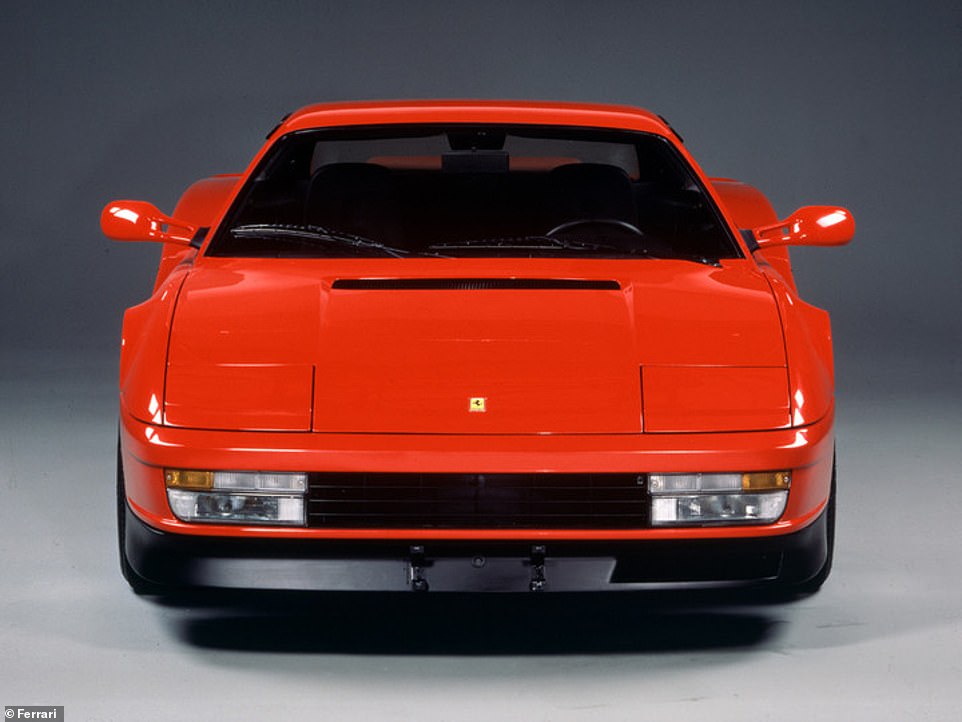
Think Ferraris from the eighties and the Testarossa jumps to the forefront of your mind. It remains an icon today
Say the word 'Testarossa' to people of a particular vintage and it will immediately transport their memories back to the 1980s.
The Ferrari Testarossa is arguably the definitive model of the decade, having been unveiled to great fanfare at the Paris Motor Show in October 1984 and instantly becoming the poster car for teenagers' bedroom walls.
The wedge-shaped supercar looked like nothing else on the road, with the Pininfarina design notable for its slicing side strakes in the doors.
With the Lamborghini Countach as its biggest rival, the two couldn't have been any more different to drive. While the Lambo was unruly with steering so heavy you needed to be a weightlifter to perform a three-point turn, the Ferrari was surprisingly user-friendly; even it's free-revving 12-cylinder engine was smooth and manageable about town.
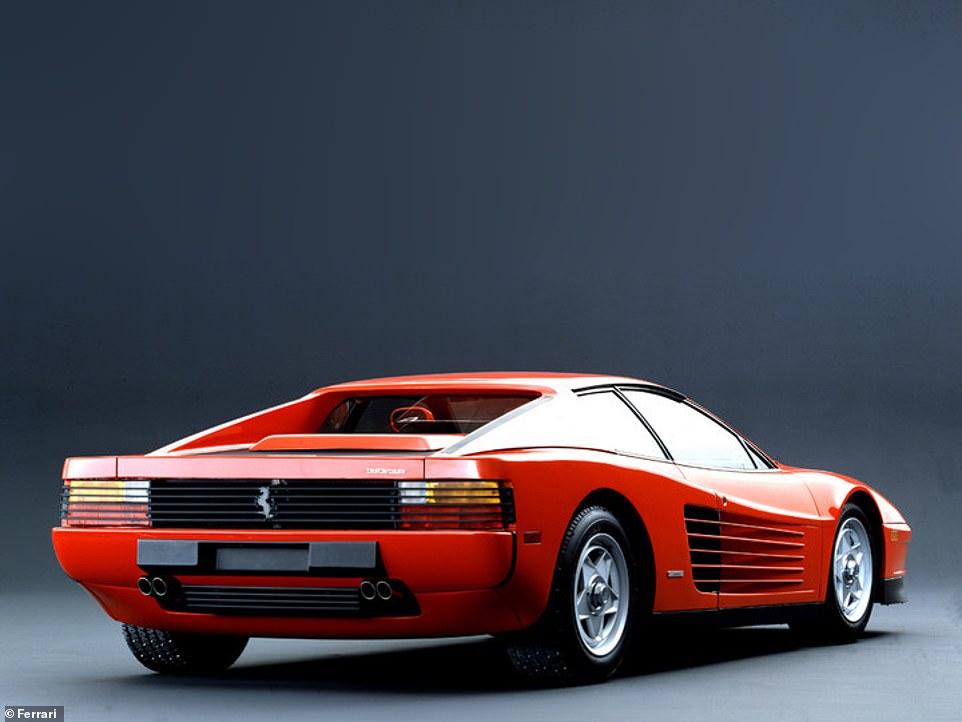
The wedge-shaped supercar looked like nothing else on the road. The Pininfarina design - with slicing side strakes - broke away from tradition and made it instantly recognisable
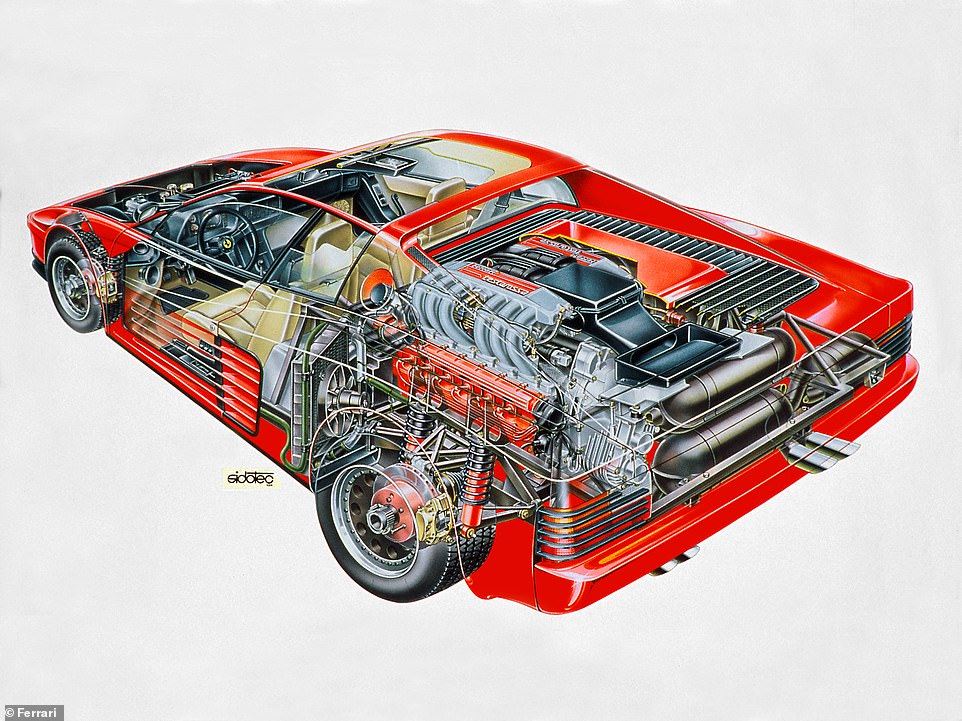
The Testarossa's biggest rival in the mid to late '90s was the Lamborghini Countach but the two were worlds apart to drive the Ferrari was surprisingly user-friendly
Yet despite its desirability, the Testarossa hasn't gone on to become a multi-million-pound collectable like other Ferraris of its generation - think the 288 GTO (which also debuted in 1984) and the F40 that arrived three years later, both of which command seven-figure sums today. And that's due to the Testarossa's sheer weight in numbers.
Almost 10,000 (including the 512TR and F512M variants) were produced until 1996 - that's almost 10 times the production volume of F40s - making it readily available and therefore [relatively] affordable.
Saying that, average values today are well ahead of where they were three years ago. Hagerty says a good Testarossa in 2021 would have cost a collector around £79,200. In 2024, the same car is valued at £114,575, which is a 45 per cent jump. However, prices topped out last year at £119,375, meaning they've come down 4 per cent in 12 months.
4. Ford RS200
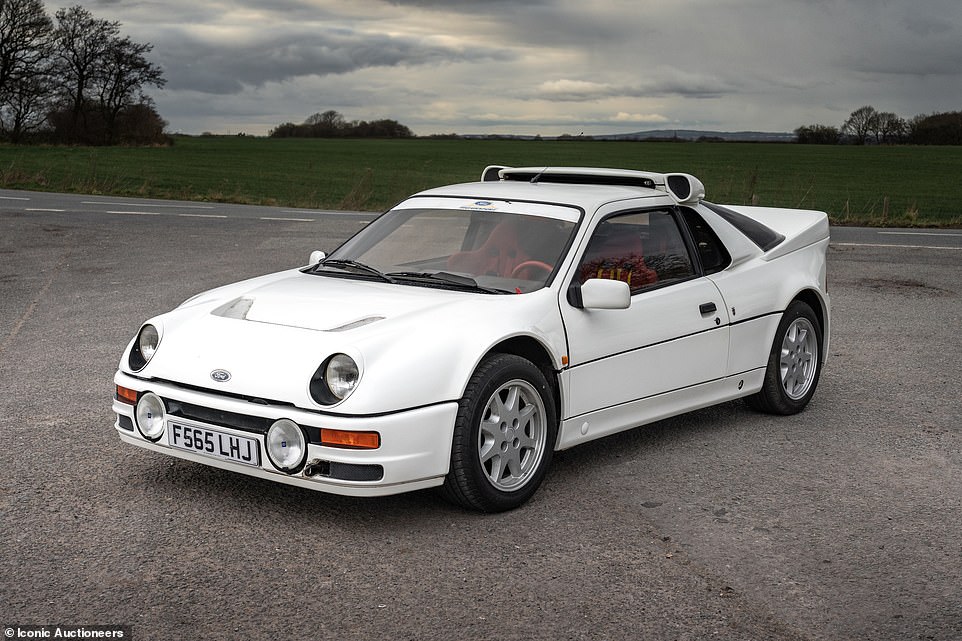
In terms of extreme road cars, there are few that match the Ford RS200. A mere 200 street-legal versions were created by the brand to allow it to take it racing in the fearsome Group B WRC rally era
Motorsport fans able to cast their minds back to the mid-eighties will remember one race series in particular - the Group B era of the World Rally Championship.
In its height around 1984, it was dominated by the likes of the Audi Quattro Sport, Lancia 037, Renault's 5 Turbo and the incredible Peugeot 205 T16. But a new kid on the block was revealed that year, hoping to enter the fray with a completely new unique proposal.
While the Audi, Peugeot and Renault were cars very loosely based on their run-of-the-mill showroom vehicles, Ford decided to take the same route as Lancia and built a bespoke rally thoroughbred - then produce 200 road-legal versions to meet regulations that allowed them to compete with it.
Ford set about production of the road-going models from 1984. They looked every bit as bonkers as the racers, though with a heavily detuned 1.8-litre turbocharged Cosworth engine
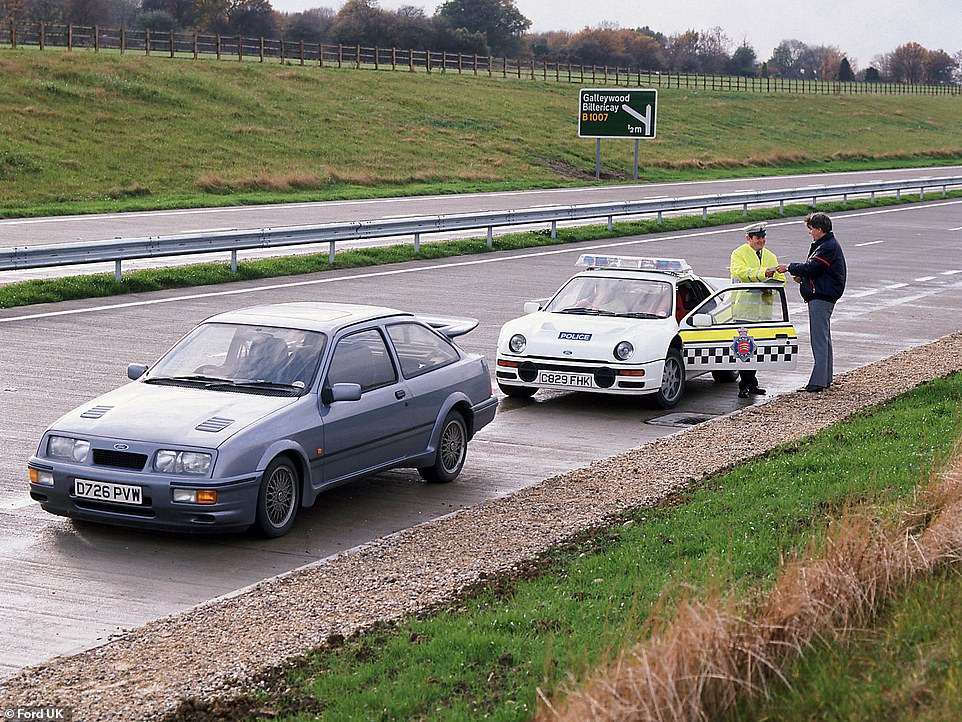
Arguably the RS200's most famous image is this one, showing a police-liveried example pulling over a Sierra RS Cosworth. The staged image was taken on the A12 in Essex, close to Ford's offices in Brentwood and the car wasn't ever used in service
This spawned the mid-engined RS200. It was like no other Ford at the time and aimed to reclaim the brand's crown as the ultimate rally machine left by the incredible Escort RS1800.
Ford set about production of the road-going models from 1984. They looked every bit as extreme as the racers, though with tamed power. The 1.8-litre turbocharged Cosworth engine was dialled back to 246bhp for most of the 200 to don number plates and a tax disc. That said, at just 1,180kg, the road-legal versions were a handful, even with four-wheel drive.
Arguably the most famous image of the RS200 was the police-liveried example pulling over a Sierra RS Cosworth used as a marketing ploy - though, in truth, a cop-spec RS200 didn't see service.
A number of teething problems developing the race car meant it didn't debut in WRC until 1986. Rally driver, co-pilot and spectator deaths that season saw Group B terminated at the end of the year, giving Ford no time to establish itself in the series.
The rarity of the RS200 means Hagerty doesn't track its values. However, we do know that the last street-spec version to sell at auction changed hands at the Retromobile 2022 by Artcurial Motorcars event for around £250,000.
5. Land Rover 90

While the Land Rover Series existed well before 1984, this was the first year the 90 name was introduced. And it remains today...
There were big changes at Land Rover some 40 years ago, beginning with the introduction of the first 110 model (110 inches in wheelbase) in March 1983, replacing the outgoing Series III.
A year later, the 90 (with a wheelbase closer to 93 inches) launched with three doors and a four-cylinder engines (a V8 followed in 1985), starting the bloodline of the long-running Defender series.
While superficially there was little to distinguish the new models from the Series III Land Rover (they used the same body panels and engines), there were tweaks made.
For instance, the Land Rover 90 and 110 were issued a full-length bonnet, had a redesigned grille and got wheel arch extensions.
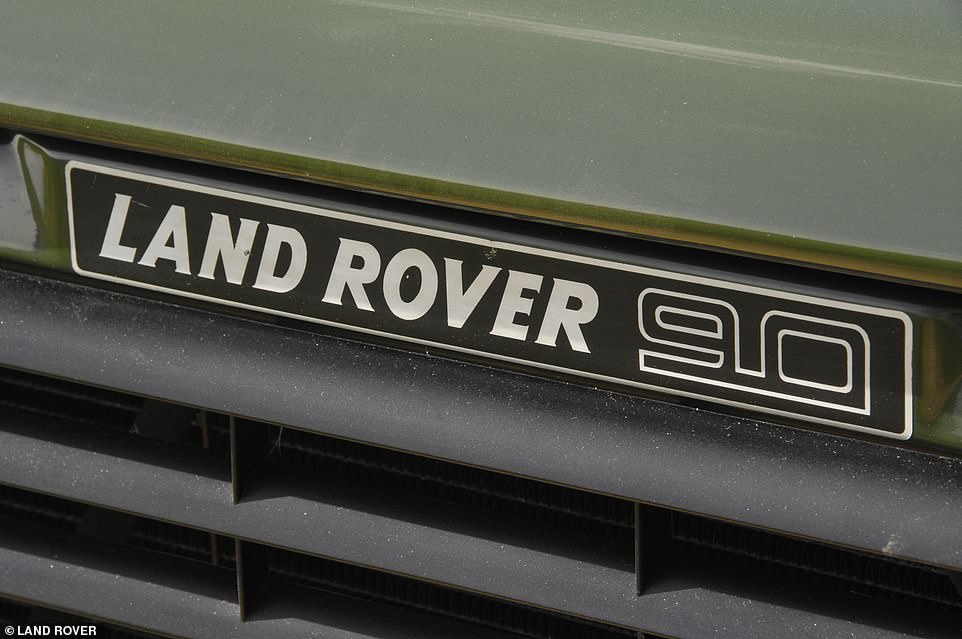
A year after the Land Rover 110, the coil-sprung 90 (with a wheelbase closer to 93 inches) launched with three doors and a four-cylinder engine
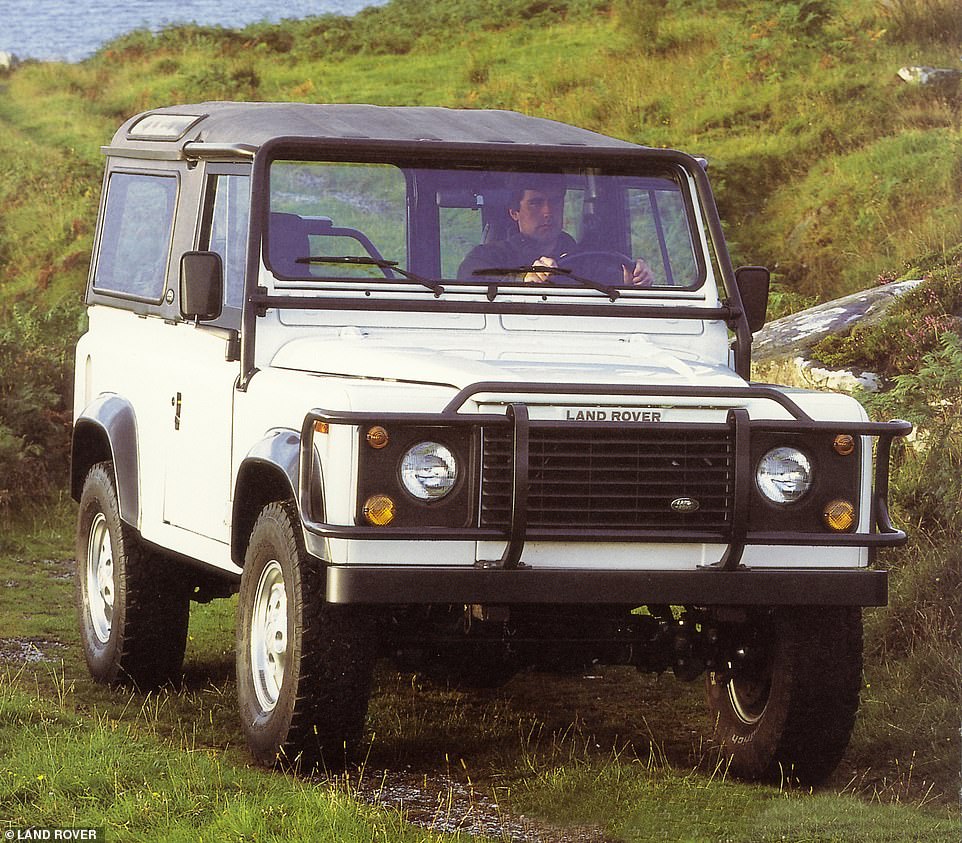
The 90 debuted a new permanent four-wheel-drive system not seen on previous Land Rover Series models. It derived from the Range Rover. The 90 also got a two-speed transfer gearbox with a lockable centre differential
Mechanically, the biggest difference for the Land Rover 90 was the introduction of coil springs. This provided a more compliant ride and meant the off-roader could be more than just an agricultural workhorse.
The new Land Rover also debuted a new permanent four-wheel-drive system derived from the Range Rover, featuring a two-speed transfer gearbox with a lockable centre differential.
While far from revolutionary in 1984, the 90 and 110 names have lasted the test of time until the present day. However, it wasn't until 1990 that they were prefixed with 'Defender'.
In terms of values, there's been a slight fall in Land Rover 90 prices in the last 12 months. Hagerty says values were around £12,300 in 2021, rising to £13,000 in 2022. However, last year, values dropped to £11,725.
6. Mercedes-Benz W124 E-Class
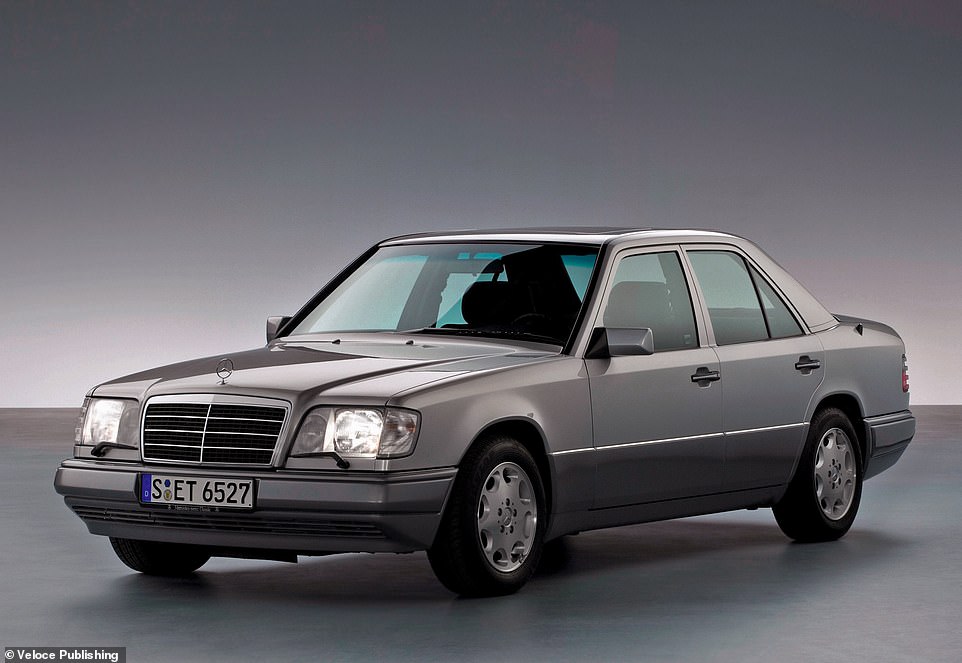
If you're over the age of 20, there's a very strong chance you've sat in the back of a Mercedes-Benz E-Class W124 before - that's because they were a hit with taxi operators across the world
Ask Mercedes fanatics of a particular vintage what their favourite generation of the E-Class is, and you could put a pretty penny on the W124 coming up trumps.
Incredibly dependable, it was so robust that it became the go-to motor for taxi companies around the world, with some still being used today.
That's because it was a supreme executive saloon - simple, roomy and incredibly comfortable.
Launched in 1984, production ran until 1997 and across five different body shapes; conventional saloon, estate, coupe, convertible and a six-door limo that was ideal for prom bookings and stag and hen weekends.
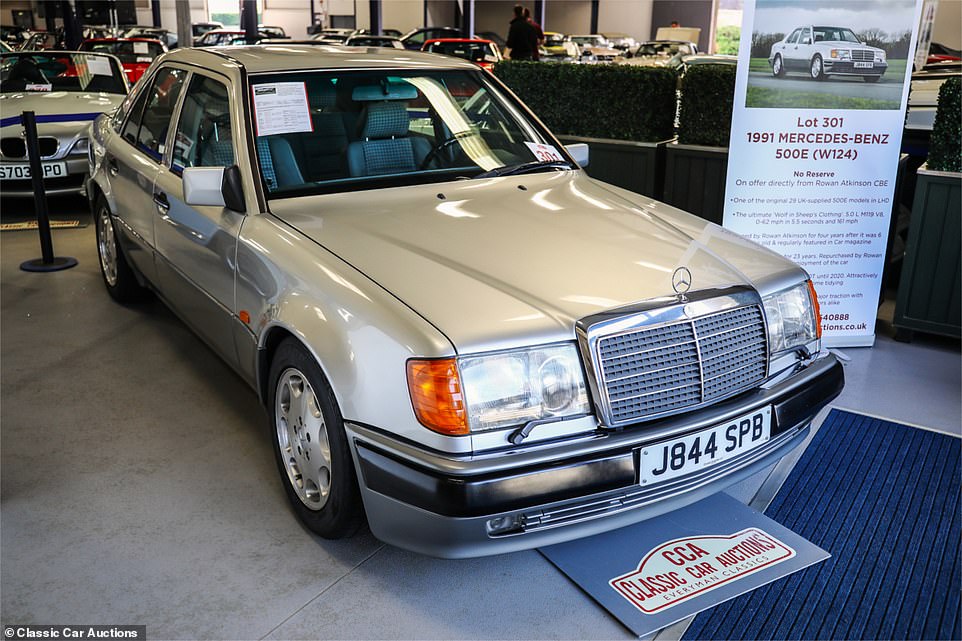
Mechanically, the W124 was an extended version of the 190E compact saloon. The 500 E V8 was the one most want to get their hands on today
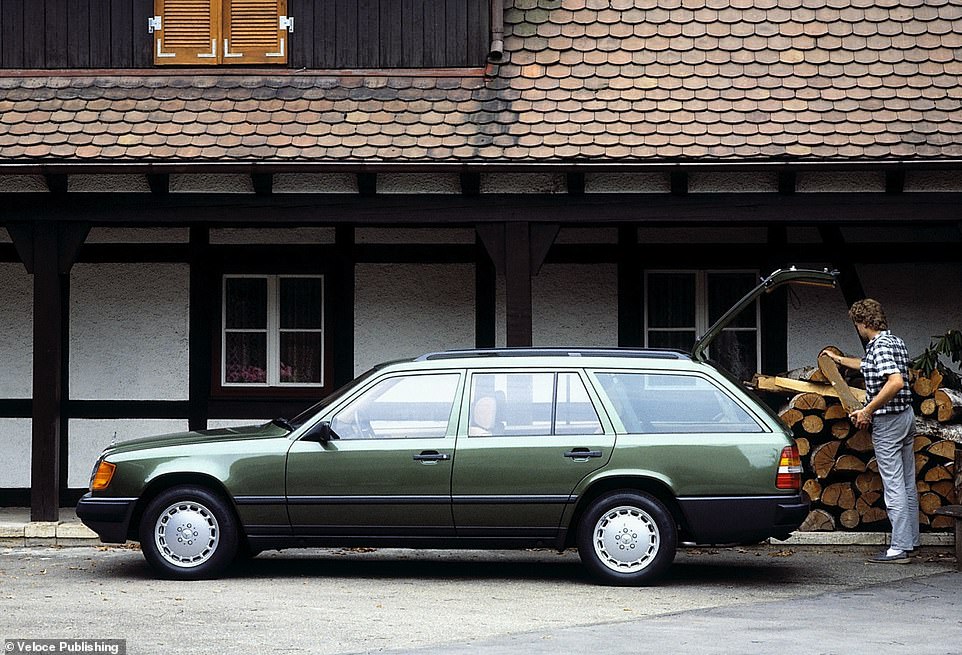
Launched in 1984, production ran until 1997 and across five different body shapes; conventional saloon, estate, coupe, convertible and a six-door limo
Mechanically, the Mercedes W124 was an extended version of the 190E compact saloon, sharing the same 2.0-litre four-cylinder engine. The E-Class also got a 2.3-litre four-pot and the addition of a 2.6-litre six-cylinder powerplant, while the 500 E V8 was the one most want to get their hands on today.
Given the W124’s incredible record for durability, it's unsurprising to learn that there are plenty up for grabs on the modern-classic market.
Hagerty only tracks the value of the in-line six-cylinder E36 AMG version of the Mercedes E-Class W124 and says values have bucked the classic car trend for falling prices in recent years. A good one today will set buyers back £22,725, whereas in 2021 the average value was £22,450. While that doesn't sound like much of a return, it's a movement in the right direction.
7. Peugeot 205 GTi
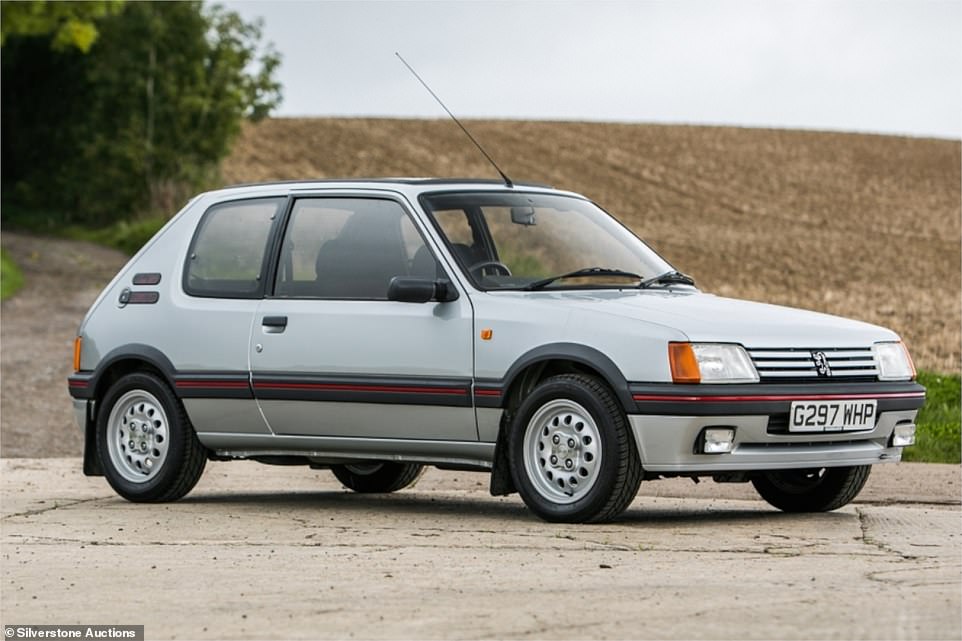
Arguably the greatest hot hatch of the 1980s, Peugeot's 205 GTi officially turns 40 in 2024. If you want to get your hands on one today, expect to pay a big price
Which is the greatest hot hatch of the 1980s? Many believe the 205 GTi holds the mantle (sorry Golf GTI fans), given its enormous sales success from 1984 to 1994 - and the huge demand and massive prices they command some 40 years later among classic enthusiasts and collectors.
When it hit showrooms four decades ago, it was available only with a 1.6-litre powerplant. It wasn't until 1986 that the 205 gained the 130bhp 1.9-litre engine, instantly giving more rapid acceleration and a higher top speed.
Which is the better option remains a heated debate among enthusiasts; some will argue the smaller, lighter engine offered better balance and handling, while 1,900cc owners will say theirs is ultimately faster.
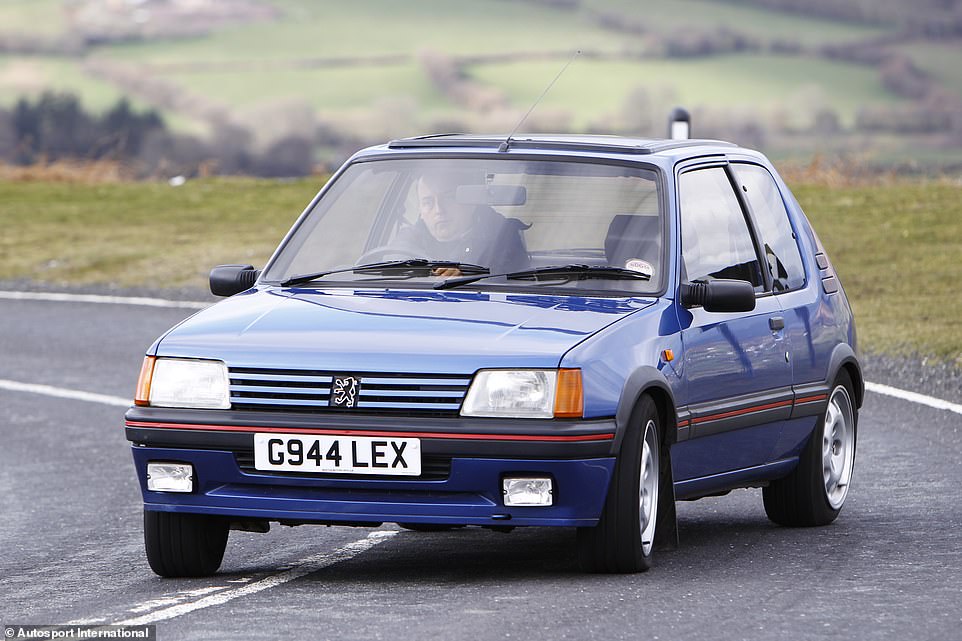
Fun to drive and easy to crash: The 205 GTi had a reputation for lift-off oversteer back in the day. However, 40 years later, the development of modern tyres has made them considerably easier to manage on the road
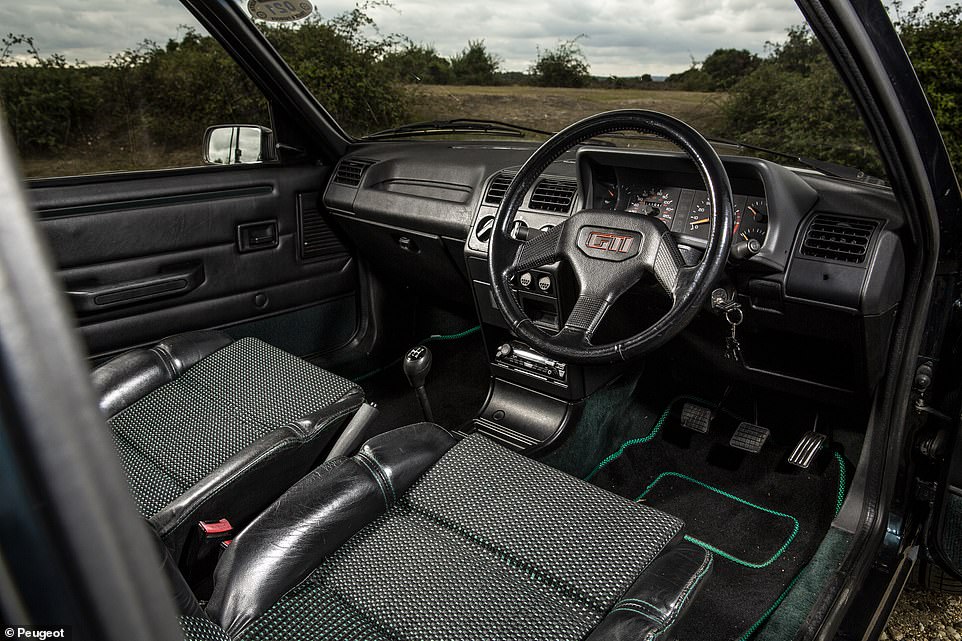
The appetite for French hot hatches is insatiable at the moment. The record highest amount paid for one came two years ago in France when a 1987 Peugeot 205 GTi 1.9 sold for 82,960 Euros (£69,768)
No matter which one you opted for in the eighties, both the 1.6 and 1.9 litre versions of the 205 GTI had a reputation for lift-off oversteer that left some in a hedge. However, 40 years later, the development of modern tyres has made them considerably easier to manage on the road.
Values have been going north in recent years. In fact, the highest price ever paid for a standard 205 GTi was a 1987 1.9 model that changed hands in France for €82,960 - which at the time was just under £69,800. A decent 205 GTI with over 100,000 miles on the clock can be yours for much less than that in the UK though - with Hagerty citing a price of about £15,000 to £21,000 for good to excellent cars.
8. Reliant Scimitar SS1
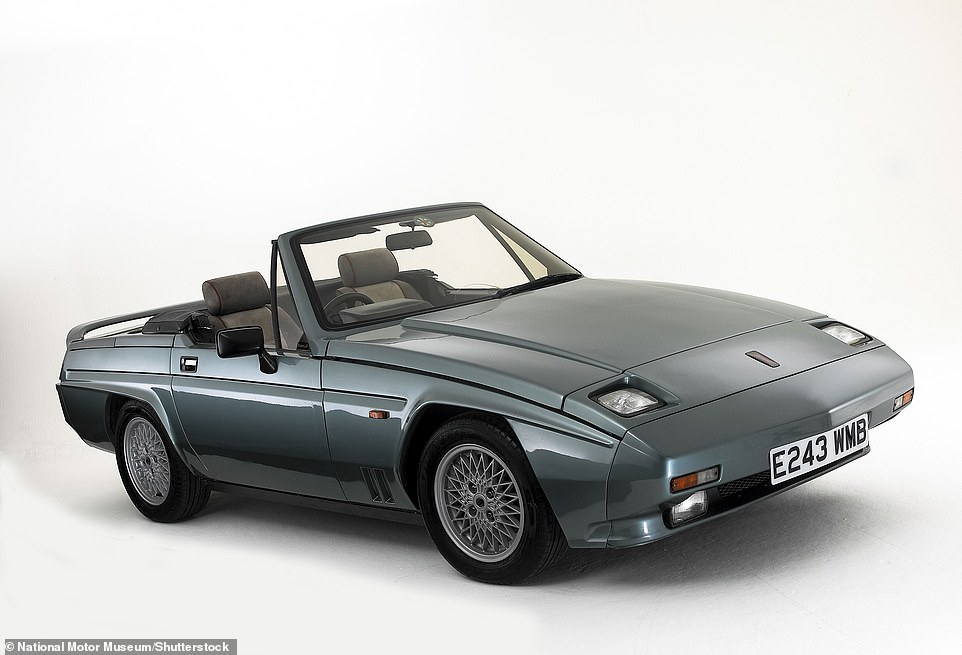
The Reliant Scimitar had all the ingredients to be successful - it was affordable, reliable and handled brilliantly. But controversial styling, underpowered engines and terrible build quality meant it couldn't live up to its promise
The eighties spawned a number of British automotive disappointments, and the Scimitar SS1 was one of them. But not because it was a bad car.
Debuting at the British International Motor Show in Birmingham that year, it had all the ingredients to be a very successful package. It filled the British roadster void in the market vacated by the MGB and Triumph TR7 and was cheap, reliable and handled with aplomb thanks to its all-independent suspension.
However, it had a number of downfalls, including the somewhat controversial looks. It was also the last car penned by Giovanni Michelotti, one of the most prolific designers of sports cars in the 20th century, but won't go down as his finest work.
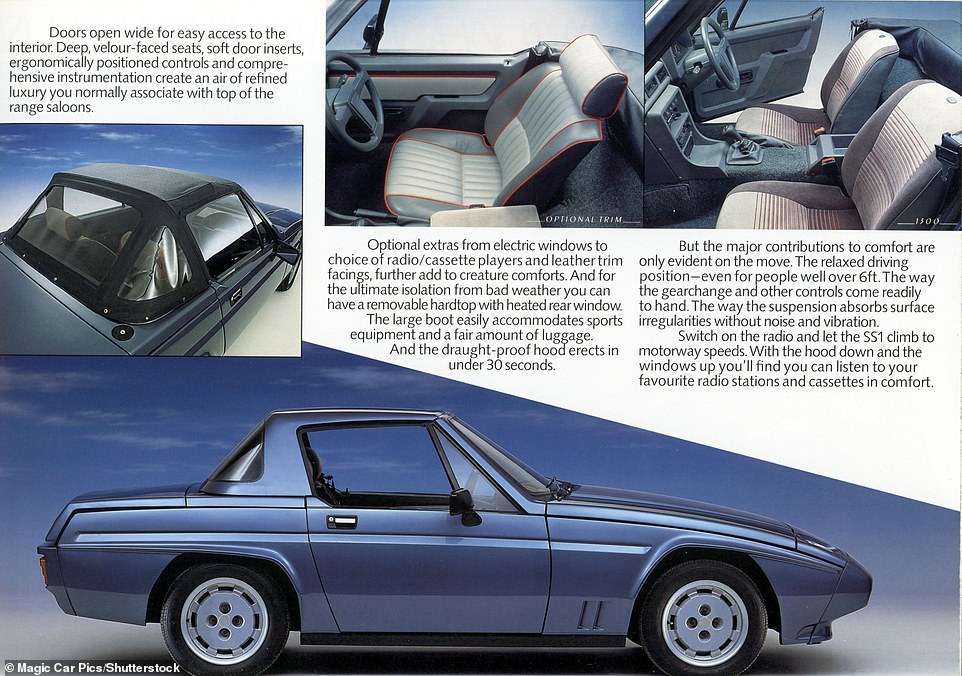
Despite talk of Reliant producing 2,000 units a year, just 1,507 Scimitar SS1s were made in its ten-year cycle, which came to an end by 1995 when Reliant went under
Then there was the Ford-supplied engines, all of which were woefully underpowered for a roadster aimed at petrolheads (though the Nissan Bluebird-derived 1.8-litre turbo that arrived in 1986 was a step up). And - as was the tendency for British-made motors - had a poor finish, notably the fibreglass body panels.
Despite talk of Reliant producing 2,000 units a year, just 1,507 models were made in its ten-year cycle. A facelift in 1990 saw it renamed to Scimitar SST, then two years later to the Sabre, which eventually ceased in 1995 with the collapse of the brand.
Hagerty says an 'excellent' 1984 example today is valued at around £4,900 to £5,300. However, with just 68 believed to still be on the road, tracking one down might be tough.
9. Toyota MR2
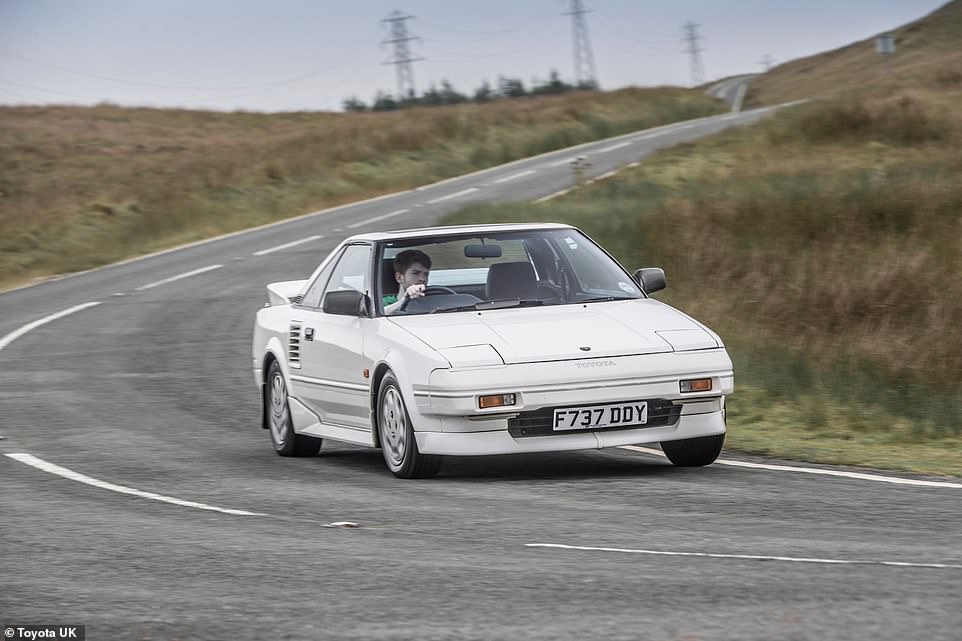
The MR2 wasn't just a departure from tradition for Toyota, it was a unique proposal from any Japanese car maker. When it arrived in 1984, no brand from the country had attempted to sell a compact, mid-engined sports car before
If the Scimitar SS1 was a two-seat sports car that failed to live up to its hype, the arrival of the Toyota MR2 registered at the opposite end of the spectrum; not only did it shock the motoring world when it was launched, it also went on to become a huge success.
No Japanese car maker had attempted to sell a compact, mid-engined sports car before, especially one that was attainable to the working-class motorist.
It was available in the UK from 1984, with the 1.6-litre 16-valve engine shared with the Corolla GT and providing plenty of power for the lightweight sportser. It boasted a top speed of 124mph and the ability to sprint from a standstill to 60mph in just 8.2 seconds, making the naturally-aspirated MR2 faster than the majority of its competition at the time.

The MR2 was available in the UK from 1984 with the 1.6-litre 16-valve engine shared with the Corolla GT. It could hit 60mph in 8.2 seconds and a top speed of 124. For an affordable sports car of the day, it was unrivalled

The value of Mk1 MR2s has been on the rise in recent years, Hagerty says. In 2021, one would set buyers back £6,175, but prices have grown to £8,375 today.
A supercharged version was launched in Japan but wasn't officially sold in Europe - though many were imported. Later in its life, UK models were also offered with the T-bar roof from the supercharged variant, with panels that could be removed entirely.
The MR2 was voted Japan’s ‘Car of the Year for 1984-85 and it set out the successful path for two generations that followed it until it went out of production in 2007.
The value of Mk1 MR2s has been on the rise in recent years, which bucks the trend for the classic market, Hagerty says. 'This is a great sports car but until recently had lingered in the used car category' but is now considered a bona fide classic, it told us. In 2021, one would set buyers back £6,175, but prices have grown to £8,375 today.
10. Vauxhall Astra Mk2
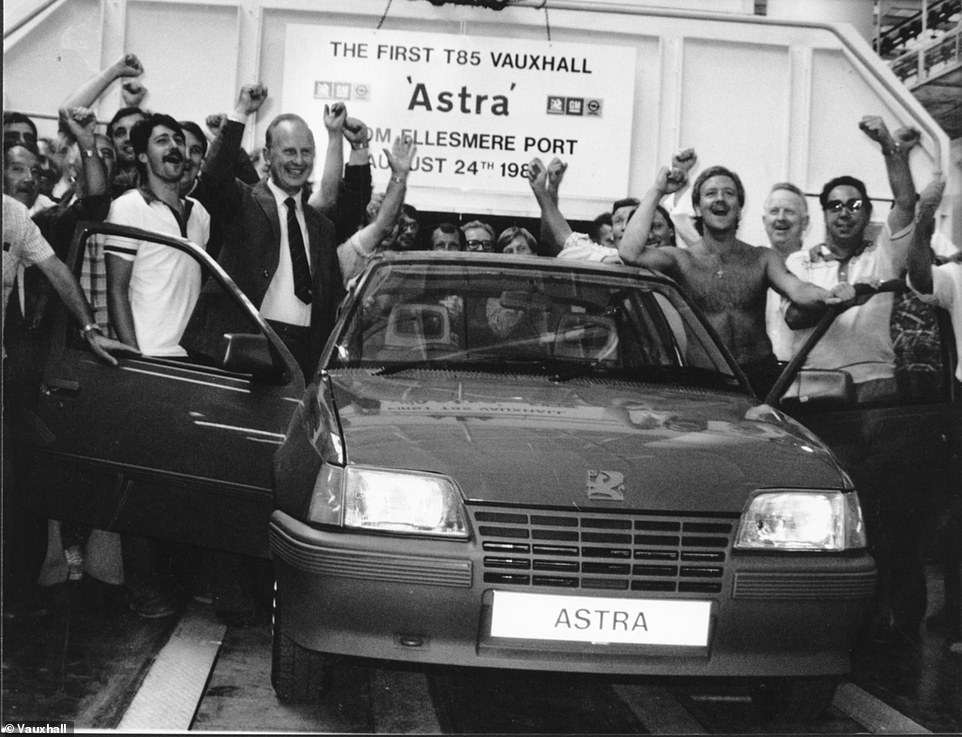
An image of the first Mk2 Vauxhall Astra coming off the Ellesmere Port production line on 24 August 1985. It became an instant sales hit
When the second-generation Astra emerged in 1984, it looked completely different to the model it succeeded. While the MkI Astra was an angular looking hatchback, the second instalment was curvaceous in an effort to improve it aerodynamically as well as stand out against its biggest competition, the Ford Escort.
It instantly became a sales hit and was even awarded the trophy of European Car of the Year in 1985.
However, most have disappeared from the roads. And that's due to two very good reasons.
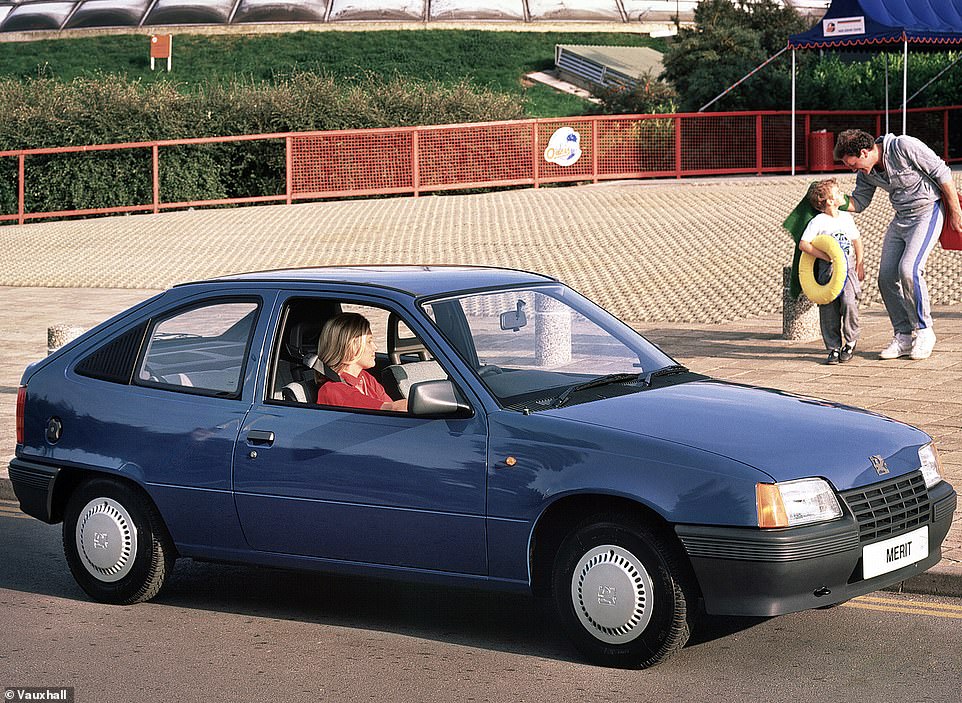
While popular when it originally hit the market, very few Mk2 Astras remain on the road today. That's because many were stolen and other rotted away
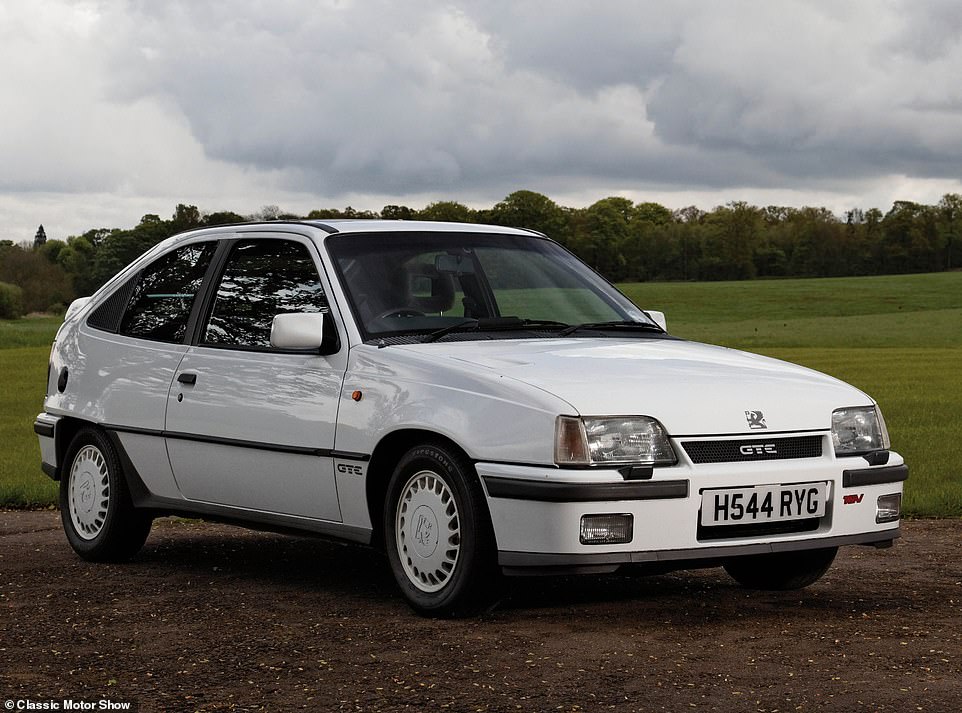
The Vauxhall Astra GTE Mk2 is the model enthusiasts are most likely to be scrambling over. Someone paid a whopping £29,500 for one in 2023
The first being its terrible security record. For years, it was Britain's most-stolen car, with joyriders and thieves easily surpassing its rudimentary locking system, often resulting in vehicles being written off, burned to a crisp or simply lost forever. The second was its tendency to rot, meaning most went to the scraphead.
The most likely to have survived are the super-collectable GTEs, with a number of enthusiasts cherishing the hot hatches.
Hagerty doesn't track the value of the Vauxhall Mk2 Astra, though the record price paid for a GTE example at a UK auction came last year when a 43,000-mile 1991 car changed hands at a WB & Sons sale for almost £29,500.
CARS & MOTORING: ON TEST
-
 Hyundai Inster review: Is it the affordable EV we've been waiting for?
Hyundai Inster review: Is it the affordable EV we've been waiting for? -
 The most controversial new car of 2024: We drive the Ford Capri EV
The most controversial new car of 2024: We drive the Ford Capri EV -
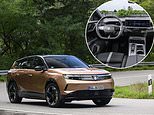 Has Vauxhall's grand plans for its new Grandland SUV paid dividends?
Has Vauxhall's grand plans for its new Grandland SUV paid dividends? -
 Aston Martin Vanquish: Britain's new brute of a sports car tested
Aston Martin Vanquish: Britain's new brute of a sports car tested -
 Renault 5 EV: Can it recreate the character and charm of the original?
Renault 5 EV: Can it recreate the character and charm of the original? -
 Polestar 4 EV: The first car sold in Britain WITHOUT a rear window
Polestar 4 EV: The first car sold in Britain WITHOUT a rear window -
 We take to the wheel of Ferrari's stunning new £336k 12Cilindri GT car
We take to the wheel of Ferrari's stunning new £336k 12Cilindri GT car -
 China's new sub-£16k EV: Leapmotor T03 arrives in UK with low price
China's new sub-£16k EV: Leapmotor T03 arrives in UK with low price -
 Peugeot E-5008: Is the £49k SUV the choice for eco-conscious families?
Peugeot E-5008: Is the £49k SUV the choice for eco-conscious families? -
 Ducati's new £30,000 Panigale V4 S costs the same as a small Mercedes
Ducati's new £30,000 Panigale V4 S costs the same as a small Mercedes -
 Is the new £22k MG ZS hybrid family-friendly SUV a genuine bargain?
Is the new £22k MG ZS hybrid family-friendly SUV a genuine bargain? -
 This £100k Volvo has driven me to distraction: EX90 SUV driven
This £100k Volvo has driven me to distraction: EX90 SUV driven -
 VW Touareg is a luxury SUV for a lower price - why is it so unpopular?
VW Touareg is a luxury SUV for a lower price - why is it so unpopular? -
 We test the new MG HS - Britain's favourite budget-friendly family SUV
We test the new MG HS - Britain's favourite budget-friendly family SUV -
 We test drive the £15,000 Dacia Spring - the UK's CHEAPEST new EV
We test drive the £15,000 Dacia Spring - the UK's CHEAPEST new EV -
 Suitable for UK climates: You can enjoy Mercedes CLE Cabrio year round
Suitable for UK climates: You can enjoy Mercedes CLE Cabrio year round -
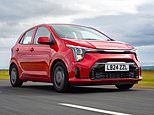 Kia's affordable Picanto offers a fun and nippy drive in the big city
Kia's affordable Picanto offers a fun and nippy drive in the big city -
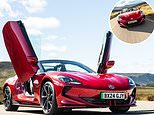 MG Cyberster review - convertible EV costs £60k and is fun to drive
MG Cyberster review - convertible EV costs £60k and is fun to drive -
 'Euros' winning Renault Scenic E-Tech gets Ray Massey's vote
'Euros' winning Renault Scenic E-Tech gets Ray Massey's vote -
 Ford Explorer: Is the £40k electric SUV a good buy for UK drivers?
Ford Explorer: Is the £40k electric SUV a good buy for UK drivers? -
 Polestar 3: Does the Tesla Model Y now have a real fight on its hands?
Polestar 3: Does the Tesla Model Y now have a real fight on its hands? -
 Lotus Eletre is an EV Lamborghini Urus rival: The hyper-SUV tested
Lotus Eletre is an EV Lamborghini Urus rival: The hyper-SUV tested -
 Dacia's new Duster is here - has it lost its value-for-money appeal?
Dacia's new Duster is here - has it lost its value-for-money appeal? -
 Alfa Romeo Tonale review: Can this SUV bring some sporting thrill?
Alfa Romeo Tonale review: Can this SUV bring some sporting thrill? -
 In a world of SUVs, can the VW Passat re-energise the estate market?
In a world of SUVs, can the VW Passat re-energise the estate market? -
 Ineos Quartermaster review: The new premium pick-up truck in town
Ineos Quartermaster review: The new premium pick-up truck in town -
 Peugeot e-3008 is attractive, sprightly and has a 326-mile range
Peugeot e-3008 is attractive, sprightly and has a 326-mile range -
 New £165k Aston Martin Vantage tested - is it better than a Ferrari?
New £165k Aston Martin Vantage tested - is it better than a Ferrari? -
 Can BMW harness the magic of the original Mini in an EV made in China?
Can BMW harness the magic of the original Mini in an EV made in China? -
 Is this the ultimate open-top super tourer? Aston Martin DB12 Volante
Is this the ultimate open-top super tourer? Aston Martin DB12 Volante -
 New Fiat 600e EV family car is here, but should wait for the hybrid?
New Fiat 600e EV family car is here, but should wait for the hybrid? -
 VW Tiguan review: Brand's best-selling SUV is back - but is it better?
VW Tiguan review: Brand's best-selling SUV is back - but is it better? -
 Should you consider the Mini Countryman EV instead of the petrol?
Should you consider the Mini Countryman EV instead of the petrol? -
 Another BMW goes electric - we test the new iX2 vs its petrol X2 rival
Another BMW goes electric - we test the new iX2 vs its petrol X2 rival -
 The 2024 Range Rover Evoque plug-in hybrid is a home-grown winner
The 2024 Range Rover Evoque plug-in hybrid is a home-grown winner -
 Britain's favourite car DRIVEN - we review the best-selling Ford Puma
Britain's favourite car DRIVEN - we review the best-selling Ford Puma -
 BMW's i5 EV offers supercar performance in an exec saloon package
BMW's i5 EV offers supercar performance in an exec saloon package -
 We drive the £76,000 Kia EV9 - Korea's all-electric Range Rover rival
We drive the £76,000 Kia EV9 - Korea's all-electric Range Rover rival -
 Has the BMW M3 Touring been worth the three-decade wait? Our review
Has the BMW M3 Touring been worth the three-decade wait? Our review -
 Has Britain's most popular small car just got much better? New Corsa
Has Britain's most popular small car just got much better? New Corsa -
 Volvo EX30 review: Sweden's new 'green' pocket rocket SUV rival Tesla
Volvo EX30 review: Sweden's new 'green' pocket rocket SUV rival Tesla -
 Is Renault's new Austral E-Tech SUV the complete package? We drive it
Is Renault's new Austral E-Tech SUV the complete package? We drive it -
 The Audi Q8 is annoyingly good for a 'sporty' coupe-style SUV
The Audi Q8 is annoyingly good for a 'sporty' coupe-style SUV -
 Ferrari Roma Spider costs £210k - here's what you get for your money
Ferrari Roma Spider costs £210k - here's what you get for your money -
 China's all-electric BYD Dolphin lands ashore - we test it on UK roads
China's all-electric BYD Dolphin lands ashore - we test it on UK roads -
 Our epic road test through Demark and Sweden in the new Polestar 2
Our epic road test through Demark and Sweden in the new Polestar 2 -
 New Abarth 500e convertible is a rare treat - it's electric and sporty
New Abarth 500e convertible is a rare treat - it's electric and sporty -
 Honda's new CR-V is bigger than its predecessor - but is it better?
Honda's new CR-V is bigger than its predecessor - but is it better? -
 We beat the new Bond to test his new car: Aston Martin DB12 review
We beat the new Bond to test his new car: Aston Martin DB12 review -
 Behind the wheel of Rolls-Royce's Spectre: We test the new EV Roller
Behind the wheel of Rolls-Royce's Spectre: We test the new EV Roller -
 Skoda's crowning glory: Superb L&K 4x4 Estate with extras driven
Skoda's crowning glory: Superb L&K 4x4 Estate with extras driven -
 Maserati Grecale test - the SUV with 50% of sales projected for women
Maserati Grecale test - the SUV with 50% of sales projected for women -
 Dacia's budget family car with seven seats! The £18,000 Jogger tested
Dacia's budget family car with seven seats! The £18,000 Jogger tested -
 This Q8 is just great: We take Audi's new Sportback e-tron for a spin
This Q8 is just great: We take Audi's new Sportback e-tron for a spin -
 Enter the Dragon! BYD Atto EV is the Chinese company's first UK model
Enter the Dragon! BYD Atto EV is the Chinese company's first UK model -
 Ferrari's first four-door family car: New £313,000 Purosangue driven
Ferrari's first four-door family car: New £313,000 Purosangue driven -
 Thrills without frills: £31,000 MG5 is one of the cheapest family EVs
Thrills without frills: £31,000 MG5 is one of the cheapest family EVs -
 Renault's Arkana ticks all the boxes for what car-buying Britons want
Renault's Arkana ticks all the boxes for what car-buying Britons want -
 Can Peugeot's chic 408 hybrid crossover be a hit in the UK? We test it
Can Peugeot's chic 408 hybrid crossover be a hit in the UK? We test it -
 We drive the Civic Type R - the rebellious bad boy in Honda's line-up
We drive the Civic Type R - the rebellious bad boy in Honda's line-up -
 Rolls Royce Spectre: What's it lke to drive the first ELECTRIC Roller?
Rolls Royce Spectre: What's it lke to drive the first ELECTRIC Roller? -
 Ineos Grenadier driven: Sir Jim Ratcliffe's £69,000 Defender
Ineos Grenadier driven: Sir Jim Ratcliffe's £69,000 Defender -
 Can you really live with a tiny Citroen Ami? Seven tasks in seven days
Can you really live with a tiny Citroen Ami? Seven tasks in seven days -
 Don't supersize me! Is the 'smaller' Volvo XC60 all the SUV you need?
Don't supersize me! Is the 'smaller' Volvo XC60 all the SUV you need? -
 We pamper some passengers in the new £211k Bentley Bentayga
We pamper some passengers in the new £211k Bentley Bentayga -
 New kind of Buzz! VW's electric MPV still feels like a hippy campervan
New kind of Buzz! VW's electric MPV still feels like a hippy campervan




















